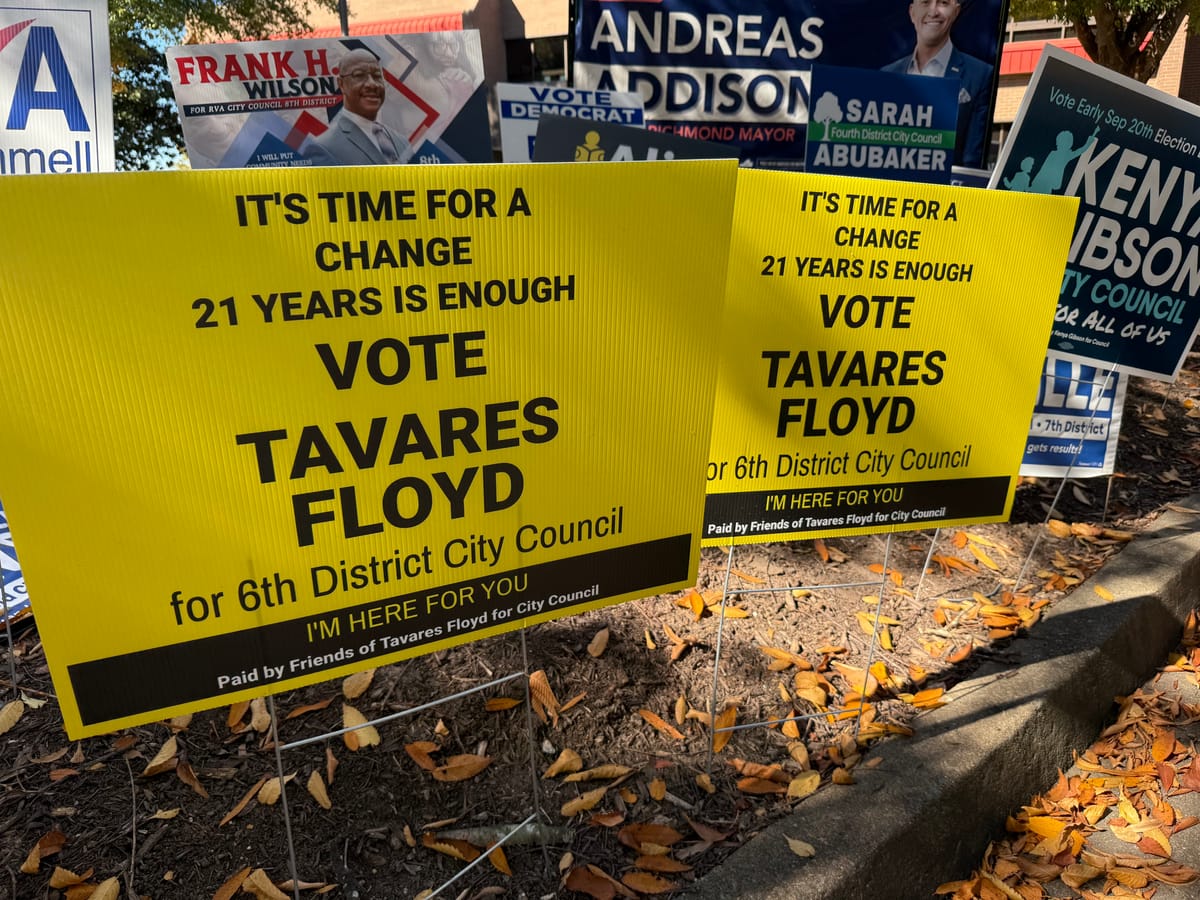Which officials can look into Tavares Floyd’s paperwork? Nobody seems to know.

As questions swirl about the accuracy of campaign paperwork filed by Richmond City Council candidate Tavares Floyd, state and local officials have shown little interest in investigating the matter thus far.
According to reporting by The Richmonder, Richmond Times-Dispatch, VPM and WTVR, several people Floyd identified as donors to his 6th District campaign have publicly said they did not give him money, the woman he listed as his campaign treasurer has said she did not do any financial recordkeeping for Floyd, and a funeral home Floyd suggested he had a significant financial stake in has said he only had a part-time job at the business.
Under state law, the intentional filing of false information on campaign documents is considered a form of election fraud punishable by felony charges. When candidates and their campaign treasurers file campaign finance reports electronically, they are asked to check a box declaring the information to be true and are given a warning about the consequences of false statements.
But officials seem confused on who’s responsible for looking into whether that paperwork is true or not.
Richmond Commonwealth’s Attorney Colette McEachin, who is broadly responsible for enforcing the law in the city, has suggested she cannot take any action on her own.
“As you may know, my office does not have any investigators, and I have not received any complaint or investigative report from any individual or from any local or state investigative agency, elections official or board regarding Mr. Floyd,” McEachin said in an email.
Richmond’s top election official says he too has no power to look into the accuracy of paperwork filed by a local candidate.
On Wednesday, Richmond Registrar Keith Balmer said that — after checking with the city attorney’s office — he has concluded no formal investigation can take place unless someone files a complaint about Floyd.
“I don’t have the actual authority to launch any sort of investigation based on what has been published regarding Mr. Floyd,” Balmer said.
Virginia law says it “shall be the duty of the general registrar” to report campaign finance violations to local prosecutors. State election officials have told Balmer they believe a local candidate’s paperwork is primarily a local matter.
“He was advised to review all of Mr. Floyd’s reports and send the candidate an ‘incomplete report notice’ which would alert the candidate to irregularities in his report,” Andrea Gaines, a spokeswoman for the Virginia Department of Elections, said when asked what guidance state officials have sent Balmer about how to handle the situation.
Asked whose responsibility it is to enforce Virginia’s campaign finance laws, Gaines said it was up to local commonwealth’s attorneys. Gaines said it’s accurate for local officials to say a complaint must be filed before any investigation, but pointed only to the section of state law that says registrars should refer issues to their local prosecutors. That law says nothing about citizens or aggrieved political opponents having to file complaints before campaign finance issues can be investigated.
When asked about the state’s guidance, Balmer said he interprets the law to mean he has to notify McEachin if a candidate doesn’t file campaign finance reports or misses a deadline. But he said he has no obligation “to assess the content of the reports.”
Virginia law also gives the state attorney general “full authority to do whatever is necessary or appropriate to enforce the election laws or prosecute violations thereof.” Attorney General Jason Miyares has used that authority to set up an election integrity unit, but his office also pointed to the state law saying local officials have jurisdiction over campaign finance issues.
Impact on the race
In an email to supporters, Floyd has said his enemies are “spreading lies” and has vowed to “fight back.” But he has mostly refused to engage with reporters asking about his campaign and, so far, has offered little explanation on why his paperwork shows donations from people who say they didn’t donate.
The other two candidates in the race are incumbent City Councilor Ellen Robertson, Floyd’s former boss, and business owner Willie Hilliard. Floyd worked as Robertson’s council liaison before running for her seat this year.
Hilliard is calling for an investigation into Floyd’s time working for Robertson at City Hall but said he isn’t seeking to have officials look into his opponent’s paperwork issues and didn’t know a formal complaint might be necessary to trigger such a process.
“I can't say for sure now that I wouldn't call for that,” he said. “I mean, I probably would if nobody else would take it up. But he really needs to just step back.”
In an interview with NBC 12, Robertson did not call on Floyd to exit the race.
“I had no idea the level of deceit,” he said of the allegations against Floyd. “Like every day it’s a new story coming out which says you pretty much lied about everything that you are.”
On Thursday, Mayor Levar Stoney affirmed his support for Robertson and said “there’s too much that doesn’t add up” about Floyd.
“His inability to make sense of it all is a disqualifier,” Stoney said.
With early voting well underway, Floyd’s name will be on the ballot when voters go to the polls on Nov. 5. What happens next, though, remains to be seen.






